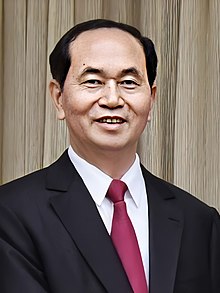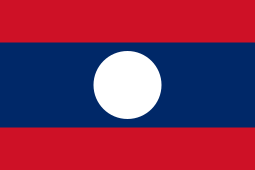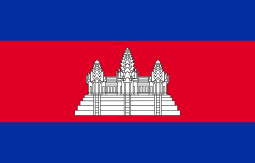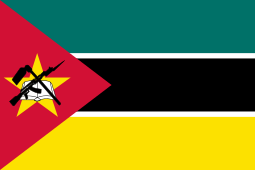Trần Đại Quang
Trần Đại Quang (12 October 1956 – 21 September 2018) was a Vietnamese politician who was the eighth President of Vietnam, in office from 2 April 2016 until his death in 2018. Trần Đại Quang was elected to the post by the National Assembly of Vietnam, and nominated by his predecessor Trương Tấn Sang who retired from office. Trần Đại Quang was one of the country's top leaders, along with the Communist Party General Secretary Nguyễn Phú Trọng (the de facto leader).
His Excellency Trần Đại Quang | |
|---|---|
 | |
| 8th President of Vietnam | |
| In office 2 April 2016 – 21 September 2018 | |
| Prime Minister | Nguyễn Tấn Dũng Nguyễn Xuân Phúc |
| Vice President | Đặng Thị Ngọc Thịnh |
| Preceded by | Trương Tấn Sang |
| Succeeded by | Đặng Thị Ngọc Thịnh (acting) Nguyễn Phú Trọng |
| President of the Vietnam Red Cross Society | |
| In office 16 August 2017 – 21 September 2018 | |
| Preceded by | Trương Tấn Sang |
| Succeeded by | Nguyễn Phú Trọng |
| Member of the National Assembly | |
| In office 22 May 2016 – 21 September 2018 | |
| Preceded by | Trương Tấn Sang |
| Constituency | Ho Chi Minh City |
| Minister of Public Security | |
| In office 3 August 2011 – 8 April 2016 | |
| Prime Minister | Nguyễn Tấn Dũng |
| Preceded by | Lê Hồng Anh |
| Succeeded by | Tô Lâm |
| Secretary of the Central Police Party Committee | |
| In office 30 August 2011 – 4 May 2016 | |
| Preceded by | Lê Hồng Anh |
| Succeeded by | Tô Lâm |
| Head of Central Highlands Steering Committee | |
| In office 3 August 2011 – 31 July 2016 | |
| Preceded by | Lê Hồng Anh |
| Succeeded by | Tô Lâm |
| Member of the National Assembly | |
| In office 2011–2016 | |
| Constituency | Ninh Binh |
| Personal details | |
| Born | 12 October 1956 Ninh Bình Province, North Vietnam |
| Died | 21 September 2018 (aged 61) Hanoi, Vietnam |
| Resting place | Kim Sơn District, Ninh Binh[1] |
| Political party | Communist Party of Vietnam |
| Spouse(s) | Nguyễn Thị Hiền |
| Children | Trần Quân |
| Education | University of Security (BA) Vietnam National University, Hanoi LLB) National Academy of Public Administration, Ho Chi Minh (PhD) (LLD) |
| Religious | Irreligion |
| Signature |  |
| Military service | |
| Allegiance | |
| Branch/service | |
| Years of service | 1972–2016 |
| Rank | |
| Awards | |
Trần Đại Quang previously served as Minister of Public Security from 2011 to 2016, Vice Head of Committee on HIV / AIDS Prevention from 2011 to 2014, and President of the Viet Nam Red Cross Society from 2017 to 2018 [2]. He was a member of the 12th Politburo of the Communist Party of Vietnam, in which he was ranked second, after General Secretary Nguyễn Phú Trọng.[3]
Trần Đại Quang joined the Communist Party of Vietnam on 26 July 1980 and became officially party member on 26 July 1981.[4] And from 1997 he became a member of the Politburo of the Communist Party of Vietnam and a member of the Central Committee of the party.
At the 12th Congress of the Communist Party of Vietnam in January 2016 Trần Đại Quang was nominated President of the Socialist Republic of Vietnam and confirmed on 2 April 2016 by the National Assembly of Vietnam. On that day, he succeeded Trương Tấn Sang. On the same day he proposed Nguyễn Xuân Phúc as the new head of government. He died in office on 21 September 2018, from a viral disease, aged 61.[5][6]
Early life
Trần Đại Quang was born on 12 October 1956[7] in Ninh Bình Province, in what was then the Democratic Republic of Vietnam. His father worked as a fish catcher in the river, while his mother worked as a banana seller.[8] They had six children, four of them boys. Later his father died. His mother struggled to raise the children. Trần Đại Quang helped his mother in farming. He was very well known for hard work, dedication, composure and calm qualities.[9]
Honors











Personal life
Trần Đại Quang was married to Madam Nguyễn Thị Hiền,[15][16] who performed ceremonial functions as the First Lady of Vietnam.
Trần Đại Quang was the second son in the family of four brothers Vinh, Quang, Sáng, Tỏ, and two sisters. His youngest brother is Trần Quốc Tỏ party secretary for Thái Nguyên Province.[17]
Death
Trần Đại Quang died at the 108 Military Central Hospital on 21 September 2018 in Hanoi from complications of a viral disease at the age of 61 while in office.[18][19] On 28 September, a memorial service was held in Hanoi, followed by a procession to his home town in Kim Sơn District, Ninh Binh where he was buried.[1]. The service was attended by many Vietnamese politicians and a plethora of foreign dignitaries, included

















Published works
- "Cyberspace - Future and Action", 2015[20]
- The people have the strength to protect the National Security, 2015 [21]
References
- "Vietnamese bid farewell to President Tran Dai Quang - VnExpress International". VnExpress International. 28 September 2018.
- "President of the Viet Nam Red Cross Society". Viet Nam Red Cross Society. 22 August 2017. Retrieved 25 June 2012.
- "Party Congress announces CPVCC Politburo members". Government of the Socialist Republic of Vietnam. 16 August 2017. Retrieved 21 September 2018.
- "Tiểu sử tân Chủ tịch nước Trần Đại Quang". 2 June 2017. Archived from the original on 2 June 2017. Retrieved 19 March 2018.CS1 maint: BOT: original-url status unknown (link)
- "Vietnam's President Tran Dai Quang dies". Bbc.com. 21 September 2018. Retrieved 21 September 2018.
- Pearson, Khanh Vu & James (21 September 2018). "Virus kills Vietnamese President Tran Dai Quang, 61". The Sydney Morning Herald. Retrieved 21 September 2018.
- "Archived copy". Archived from the original on 22 January 2015. Retrieved 22 January 2015.CS1 maint: archived copy as title (link)
- "Cậu trò nghèo trường làng thành Chủ tịch nước | Báo Giao thông". 14 November 2017. Archived from the original on 14 November 2017. Retrieved 19 March 2018.CS1 maint: BOT: original-url status unknown (link)
- "Cậu trò nghèo trường làng thành Chủ tịch nước". Báo Giao thông. 4 April 2016. Retrieved 19 May 2017.
- "General Tran Dai Quang received Fatherland Defense Order". Public Security News.
- "General Tran Dai Quang received Military Exploit Order". Public Security News.
- "Prime Minister Nguyen Tan Dung awarded the Military Exploit Order to General Tran Dai Quang in 2015". von.vn.
- "President Tran Dai Quang received Jose Martin Order (Vietnamese)". NEWSPAPER OF THE GOVERNMENT OF THE SOCIALIST REPUBLIC OF VIET NAM.
- "Tran Dai Quang received the order of national gold by Mr Phankham Viphavanh, Vice President of Laos". Baochinhphu.vn.
- "Vietnam president appears in public for first time in more than a month". Reuters. Retrieved 29 August 2017.
- "Cảm động với hình ảnh phu nhân Chủ tịch nước đến với bà con vùng lũ". Dantri.com (in Vietnamese). Retrieved 19 March 2018.
- "Ông Trần Quốc Tỏ làm Bí thư Thái Nguyên". VietNamNet. Retrieved 19 March 2018.
- "Vietnam's President Tran Dai Quang dies". Bbc.com. 21 September 2018. Retrieved 21 September 2018.
- Pearson, Khanh Vu & James (21 September 2018). "Virus kills Vietnamese President Tran Dai Quang, 61". The Sydney Morning Herald. Retrieved 21 September 2018.
- "Minister Tran Dai Quang publishes the book "Cyberspace - Future and Action." in 2015". Trandaiquang.org.
- "Minister Tran Dai Quang publishes the book "The people have the strength to protect the Fatherland." in 2015". Vietnamnet.vn.
| Political offices | ||
|---|---|---|
| Preceded by Trương Tấn Sang |
President of Vietnam 2016–2018 |
Succeeded by Đặng Thị Ngọc Thịnh Acting |
| Government offices | ||
| Preceded by Lê Hồng Anh |
Minister of Public Security 2011–2016 |
Succeeded by Tô Lâm |
| Order of precedence | ||
| Preceded by Nguyễn Phú Trọng as General Secretary of the Communist Party of Vietnam |
Rank of the Communist Party of Vietnam 12th Politburo |
Succeeded by Nguyễn Xuân Phúc as Prime Minister of Vietnam |
| Diplomatic posts | ||
| Preceded by Pedro Pablo Kuczynski |
Chair of the Asia-Pacific Economic Cooperation 2017 |
Succeeded by Peter O'Neill |